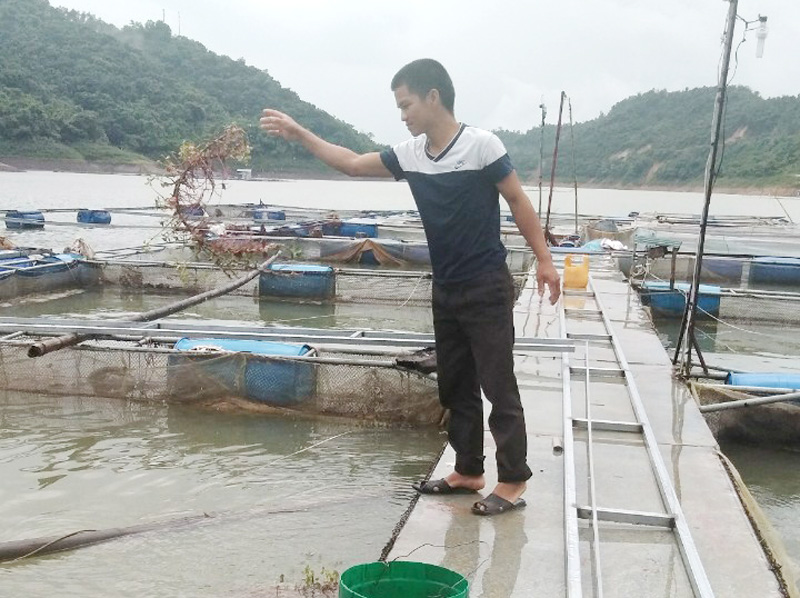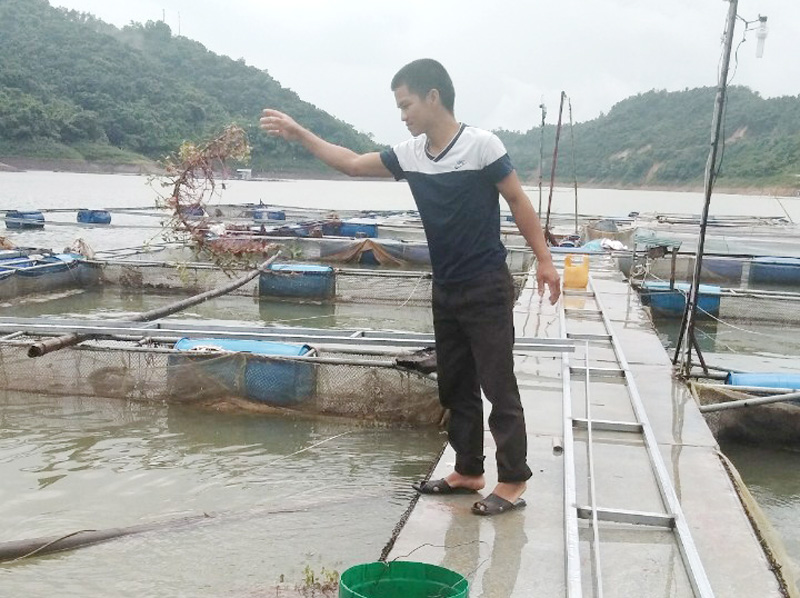
(HBO) - That fisherman is Mr. Dinh Van Linh in Trang village, Binh Thanh commune, Cao Phong district. From his experience, he not only enriched by himself but also "dragging" hundreds of households to be back for fish cage raising.

Raising cage fish, Mr. Linh earns hundreds of
millions of dongs a year.
In 2014, he followed a few households in the
village to invest in raising cage fish. Besides the effort and materials such
as his own bamboo, Luong trees, he spent more than 10 million VND buying grass
carps, black carps and net to raise 2 first cages. After a few months of good
care, fish grew up fast. In early May, when the first rains fell, the water in
the streams flowed into the river. The water was muddy with many impurities, so
the fish in his cage died out. Do not be discouraged, in the following year; he
continued to invest his capital in building more cages with more than 30
million VND. Just like last year, after several months of efforts, his fish
died and had to be sold out in the market. At this time, he realized that most
of the fish in the farms near the lakeside was dead. When he came far away from
the bank to get the water, he found that the water there was still clean. He
went to Thuy Nai commune to learn about fish farming and found that some
fishermen raising fish near the bank also had their fish died due to lack of
oxygen. Only one household carrying cages far away from the bank did not have
fish died.
In 2016, he borrowed more capital to continue
investing in raising 10 cages and dragging cages offshore. However, the daily
care tasks were more difficult, for example, transporting food and protecting
the fish but it is safe for the fish at the beginning of the rainy season.
Later that year, he earned nearly one hundred million VND from his fish cages.
Raising successfully, with encouragement, he continued to borrow more capital
to invest in 20 fish cages. From bamboo or Luong cages, he bravely invested in
iron cages. Each year, his family exports more than 4 tons of commercial fish
to the market, earning hundreds of million VND.
From the successful implementation of Mr.
Dinh Van Linh, many people in the village have learned to drag away their cages
to raise fish. At present, the cage fish farming Cooperative of Binh Thanh
Commune operated by him has 23 households participating to raise cage fish with
hundreds of cages. Each year, the Cooperative produces several tonnes of fish,
creating jobs for nearly 100 workers. Many households has become rich and had a
stable life from that.
According to data from the Hoa Binh Provincial Party Committee, the industrial production index for the first six months of 2025 is estimated to have increased by 20% compared to the same period last year. This marks the highest year-on-year growth rate for this period since 2020.
In the first six months of 2025, Hoa Binh province’s export turnover was estimated at 1.145 billion USD, marking an 18.11% increase compared to the same period in 2024. Import turnover was estimated at $ 804 million, a 17.15% increase, which helped the province maintain a positive trade balance.
The lives of the ethnic minority farmers in Tan Lac district have gradually improved thanks to the new directions in agricultural production. This is a testament to the collective strength fostered through the professional associations and groups implemented by various levels of the district’s Farmers’ Union.
With the motto the "product quality comes first,” after nearly one year of establishment and operation, Muong village’s Clean Food Agricultural and Commercial Cooperative, located in Cau Hamlet, Hung Son Commune (Kim Boi district), has launched reputable, high-quality agricultural products to the market that are well-received by consumers. The products such as Muong village’s pork sausage, salt-cured chicken, and salt-cured pork hocks have gradually carved out a place in the market and they are on the path to obtaining the OCOP certification.
In the past, the phrase "bumper harvest, rock-bottom prices" was a familiar refrain for Vietnamese farmers engaged in fragmented, small-scale agriculture. But today, a new spirit is emerging across rural areas of Hoa Binh province - one of collaboration, organisation, and collective economic models that provide a stable foundation for production.
Maintaining growing area codes and packing facility codes in accordance with regulations is a mandatory requirement for agricultural products to be eligible for export. Recently, the Department of Agriculture and Environment of Hoa Binh province has intensified technical supervision of designated farming areas and packing facilities to safeguard the "green passport" that enables its products to access international markets.



